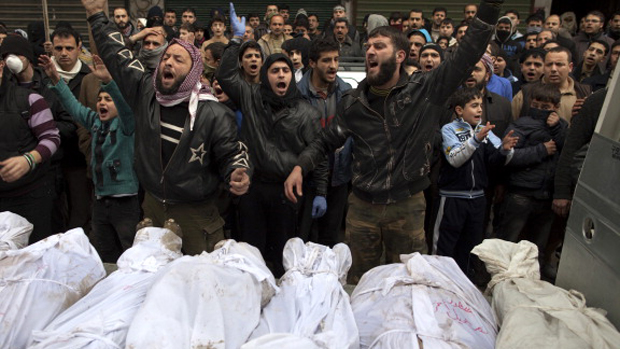Syria 'killed and tortured' 11,000 detainees, say lawyers
Evidence of 'systemic killing' by government officials emerges day before start of peace talks

A free daily email with the biggest news stories of the day – and the best features from TheWeek.com
You are now subscribed
Your newsletter sign-up was successful
SYRIA was involved in the "systematic killing" and torture of 11,000 detainees and government officials could face war crimes charges, The Guardian reports.
The claims are based on a report which analysed a "huge cache" of digital photographs smuggled out of Syria by a former military photographer, the paper says. The images, which show the bodies of people who died while in the custody of regime's security forces between March 2011 to last August, reveal that many corpses were emaciated, bloodstained and bore signs of torture.
Some of the bodies - mostly of young men - had no eyes; others showed signs of strangulation or electrocution, the paper says.
The Week
Escape your echo chamber. Get the facts behind the news, plus analysis from multiple perspectives.

Sign up for The Week's Free Newsletters
From our morning news briefing to a weekly Good News Newsletter, get the best of The Week delivered directly to your inbox.
From our morning news briefing to a weekly Good News Newsletter, get the best of The Week delivered directly to your inbox.
The 55,000 images have been analysed by "three eminent international lawyers" who have compiled a report commissioned by Qatar, a supporter of Syria's rebels. The authors are Sir Desmond de Silva QC, former chief prosecutor of the special court for Sierra Leone, Sir Geoffrey Nice QC, the former lead prosecutor of former Yugoslavian president Slobodan Milosevic, and Professor David Crane, who indicted President Charles Taylor of Liberia at the Sierra Leone court.
One of the three told the BBC there was evidence of government involvement in the atrocities, a claim vehemently denied by the regime of Bashar al-Assad.
The timing of the report's release – a day before the start of talks in Geneva designed to end the civil war in Syria – is significant, the BBC says. Those talks are due to go ahead as scheduled after a last-minute invitation to Iran to participate was withdrawn by UN chief Ban Ki-Moon.
The invitation had prompted Syria's main Opposition group to threaten to boycott the talks and was criticised by the US.
A free daily email with the biggest news stories of the day – and the best features from TheWeek.com
Reuters says the withdrawal of Iran's invitation had averted the collapse of the talks, but not without cost. The invitation had triggered "24 hours of confusion that dismayed diplomats who have spent months cajoling Assad's opponents to negotiate".
The BBC says the 31-page report into the torture and killing of detainees in Syria is "more detailed and on a far larger scale than anything else that has yet emerged from the 34-month crisis".
The three lawyers who compiled the report say they found the military photographer, known only as Caesar, to be credible and truthful and his account "most compelling".
Caesar told the investigators his job was "taking pictures of killed detainees". He did not claim to have witnessed executions or torture. But he did describe a highly bureaucratic system.